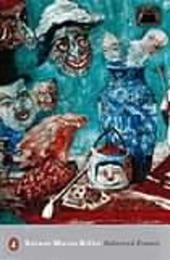
|
Selected Poems
Paperback / softback
Main Details
| Title |
Selected Poems
|
| Authors and Contributors |
By (author) Rainer Maria Rilke
|
| Series | Penguin Modern Classics |
|---|
| Physical Properties |
| Format:Paperback / softback | | Pages:96 | | Dimensions(mm): Height 198,Width 129 |
|
| Category/Genre | Poetry by individual poets |
|---|
| ISBN/Barcode |
9780141183497
|
| Classifications | Dewey:831.912 |
|---|
| Audience | |
|---|
|
Publishing Details |
| Publisher |
Penguin Books Ltd
|
| Imprint |
Penguin Classics
|
| Publication Date |
22 February 2001 |
| Publication Country |
United Kingdom
|
Description
Hailed as the greatest modern lyrical poet of Germany, Rainer Maria Rilke's genius lies in his passion for perfection, artistic integrity and 'willingness to remain a perpetual beginner'. The verse contained in this selection ranges from the objective, naturalistic descriptions of his earliest works to the increasingly effusive outpourings of half-religious ecstasy and anguish that characterize his later poems and culminates in the overwhelmingly personal vision of the famous 'Duino Elegies' and 'The Sonnets to Orpheus', in which his most intense experiences of living and being find their noblest expression.
Author Biography
Date- 2013-08-06 Rainer Maria Rilke (1975-1926), one of Germany's greatest lyrical poets, was born in Prague. He studied literature and the history of art in Munich and Berlin, and lived for some time in Paris where he was a secretary to the sculptor Rodin. He died in Switzerland. Rainer Maria Rilke was born in Prague in 1875 and died in Valmont, Montreux, in 1926. Throughout his life he travelled restlessly around Europe, meeting Tolstoy in Russia (1900), working as 'secretary' to Rodin in Paris (1905-6), enjoying some aristocratic hospitality (especially at Castle Duino, near Trieste, as guest of Marie von Thurn und Taxis, between 1910 and 1914), working as a clerk in Austria during the war, but finally settling at the Chateau de Muzot, Valais, after 1922. The turning-points in his career are the Neue Gedichte ('New Poems') of 1907-8, together with the journal-novel of the same period, Die Aufzeichnungen des Malte Laurids Brigge (1910); and Duineser Elegeien and Die Soneete an Orpheus of 1922. His final interest was Paul Valery whose poems, Charmes, he translated in 1925 and imitated in his own Poemes francais.
|